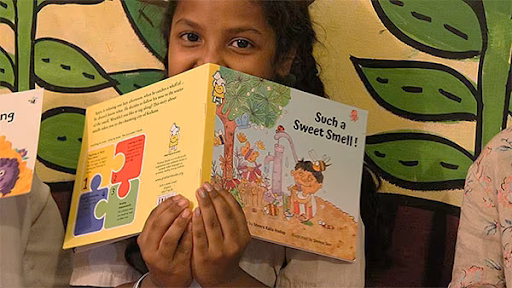
Client Name: CISCO
Location: Gujarat, Karnataka, Uttar Pradesh and Chattisgarh
Background Context: Under the India Cash Grant Program, conceptualized to drive problem-solving through innovation and the use of technology, CISCO undertook six diverse CSR projects, catering to different sets of beneficiaries.
Development Solutions (DS) was commissioned to undertake an impact assessment of three out of six projects, implemented by Pratham Books, Sikshana, and Indus Action. An assessment framework incorporating the Organization for Economic Co-operation and Development (OECD) – DAC criteria was framed to assess the impact of the intervention across programs. The evaluation assessed the relevance, coherence, effectiveness, efficiency, impact, and sustainability of the interventions.
PRATHAM BOOKS- STEM STORY BOOKS PROGRAM
Project: Development of Story Books for Children for Augmenting their Reading and Learning
CISCO developed a strategic partnership with Pratham Books to address lack of STEM education and low foundational skills among students in government schools and low-income private schools. Interventions undertaken under the program are:
Assessment Objectives:
DS undertook an impact assessment program
with the following objectives:
Approach and Methodology:
SIKSHANA FOUNDATION-PRERNA 2.0 PROGRAM
Project: Foundation Arithmetic Skills for Students with Developmental Needs through CLAP and strengthen 21st Century Skills through Project Based Learning (PBL)
CISCO developed a strategic partnership with Sikshana Foundation to address the lack of foundational literacy & arithmetic skills in remedial students and build and strengthen their 21st-century skills. Under Prerna 2.0 program, two modules were developed and introduced to teachers for their capacity building and facilitated student learning. The two modules were:
Assessment Objectives:
DS undertook an impact assessment of the program with the following objectives:
Approach and Methodology:
INDUS ACTION: EKLAVYA PROGRAM
Project: Facilitate Implementation of Right to Education (RTE) through Technology Support
CISCO developed a strategic partnership with Indus Action to address the gaps in the implementation of Right to Education and Right to Food, by introducing and strengthening technology solutions for improved government facing and community facing products.
The interventions include:
Assessment Objectives:
DS undertook an impact assessment of the initiative with the following objectives:
Approach and Methodology:
Impact
The valuable insights and recommendations from the assessment will play a crucial role in shaping informed decision-making for CISCO's significant education-focused programs, alongside its implementation partners. Moreover, the report and presentation prepared by DS will provide valuable input for CISCO's monitoring strategies, in collaboration with their dedicated monitoring and evaluation partner.
